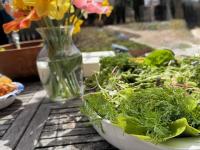Climate Creativity
What if everyone in Camden got electricity from nearby solar arrays and windmills for way less than it costs now, delivered by a helpful state-owned utility instead of Central Maine Power? What if electric vans regularly delivered people along routes from Belfast to Thomaston and back, hooking into longer-distance electric buses that ran multiple times each day? What if there were bike lanes through central Camden? And a fish ladder at the harbor so beautiful that locals and tourists alike gathered at cafes and restaurants to admire it and the jumping fish, even more than they do now at Damariscotta Mills? What if… (fill in the blank)
I’ve been reading English ecologist Rob Hopkins’ book From What Is To What If. It inspires such flights of imagination – and it’s a perfect tonic for those convinced that there’s little we can do to combat the frightening Climate Crisis and that what we can do will be unpleasant. As Hopkins puts it, “If there is a consensus about anything in the world at this point, it seems to be that the future is going to be awful.”
Instead, Hopkins – whose views on the seriousness of the climate threat are akin to those of Greta Thunberg -- suggests that we start imagining “stories of what life could look like if we were able to find a way over the course of the next 20 years to be bold, brilliant and decisive, to act in proportion to the challenges we are facing and to aim for a future we actually feel good about.”
Then we set about creating that feel-good world we imagine, beginning at local level. We don’t wait for a new president and congress in Washington to figure it out. We act right here at home to get oil out, and good things like more public transport, EVs, walking and bicycling and local food into our lives.
Hopkins founded the “Transition” movement, aimed at encouraging communities to make their energy supply, their food, their way of being in the world not just carbon-free but people- and earth-friendlier. It may sound Pollyannaish, but so can anything these days that offers imaginative but plausible solutions to a future that has so many people paralyzed by fear.
Midcoast Maine doesn’t have Hopkins-style Transition Towns yet, but people are starting to imagine them – the huge and necessary first step in Hopkins’ view. Start just after minute 56 in this video of a Jan. 7 Camden Select Board discussion of energy initiatives for a prime example.
The Camden Select Board and town manager’s determination to urgently explore ways to get enough renewable generation in place to cover all municipal electricity use by the town itself is wonderful to behold. I particularly like the notion of “parallel” explorations of different ways to accomplish this. They don’t want to waste time, so they’re talking about checking out multiple ideas simultaneously.
The imaginative power of the discussion peaks in a heart-felt but also hard-headed interjection by Select Board member Marc Ratner on how Camden “can and should do more,” including making carbon-free electricity available to all Camden businesses and households, not just the municipality itself. The more solar and perhaps wind we build, the more we save. If we own the facility, we will have its output for nearly nothing once its cost is paid off.
No decisions were made but they’re coming soon. Select Board chair Bob Falciani wants to hold a public workshop in between.
Camden isn’t alone on the Midcoast in imagining a new energy era. Solar now covers 90% of Belfast’s municipal energy needs. Rockland is considering a large solar project on Route 17. Slightly further afield, a member of York, Maine’s town energy committee this fall outlined to the Camden Energy and Sustainability Committee York’s ambitious goals and strategies for cutting carbon emissions by 50% by 2030 and 100% by 2050.
Camden will this year consider similar targets as part of commitments it took on even before York, or any other Maine community, by signing the Global Covenant of Mayors. More on that soon!
United States
About this blog:
Tales from the Transition

I’m Sarah Miller, a semi-retired international energy and business journalist and editor, and now a Camden resident. Having spent a career learning about old energy, I’ve turned to new energy in recent years. In doing so, I’ve come to see how important fossil fuels and the way they work were to the structure of 19th and 20th Century economies and societies. I’ve also started to imagine what cleaner, more distributed energy forms could mean for the structure of 21st Century economies and societies. The climate crisis is frightening, but the energy and social transitions that accompany it can bring us a better world -- if communities like ours here on the Midcoast work in a bottom-up, “distributed” way to make it so. That’s what Tales from the Transition is all about.
I am active in the community through the Camden Energy and Sustainability Committee, the Camden Philosophical Society, the board of Bay Chamber Concerts and Music School, and the climate activist group Climate Matters Maine. I am a former president of the Camden Conference. The views expressed in this blog, however, are strictly my own.




















